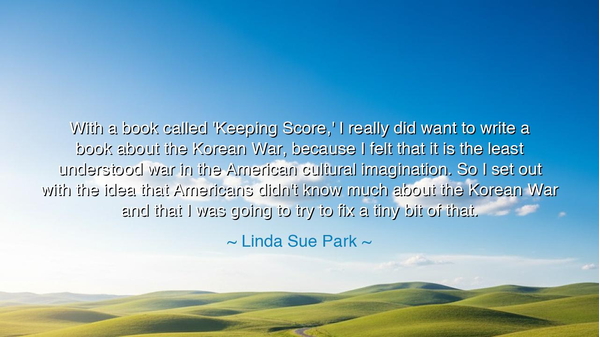
With a book called 'Keeping Score,' I really did want to write a
With a book called 'Keeping Score,' I really did want to write a book about the Korean War, because I felt that it is the least understood war in the American cultural imagination. So I set out with the idea that Americans didn't know much about the Korean War and that I was going to try to fix a tiny bit of that.






The words of Linda Sue Park — “With a book called ‘Keeping Score,’ I really did want to write a book about the Korean War, because I felt that it is the least understood war in the American cultural imagination. So I set out with the idea that Americans didn't know much about the Korean War and that I was going to try to fix a tiny bit of that.” — are a quiet yet profound testament to the responsibility of the storyteller. In these lines, Park speaks not merely as an author but as a keeper of memory, one who stands against the silence that time and indifference often cast over history. Her words remind us that to write is not only to create, but to bear witness — to give voice to the forgotten and light to what the world has chosen to overlook.
In the vast landscape of wars that have scarred the twentieth century, the Korean War remains a shadowed chapter — often called “the Forgotten War.” Fought between 1950 and 1953, it was a conflict that reshaped nations, divided a people, and claimed millions of lives, yet in the American mind it has never occupied the space that World War II or Vietnam has. Linda Sue Park, whose own heritage connects deeply to Korea, saw this absence — not merely as a historical gap but as a wound in cultural understanding. Her novel Keeping Score became her way of mending, even slightly, the tear between memory and meaning. Through the eyes of fiction, she sought to awaken empathy where there had been ignorance, and to bring the forgotten faces of war back into the imagination of her readers.
This act of remembrance is ancient in its spirit. From the earliest days, storytellers have stood as guardians of the past. When the battles ended and the kings fell silent, it was the poets, the bards, and the chroniclers who ensured that the deeds, the grief, and the courage of ordinary people were not erased. Homer sang of Troy not only to glorify heroes but to remind future generations of the cost of pride and conflict. So too does Park, in her own age, take up that sacred task — to ensure that what is lost in history’s noise is reborn in the reader’s heart. In doing so, she affirms that imagination itself is an instrument of truth, and that stories can do what statistics never will: make the unseen seen again.
To understand the depth of Park’s purpose, we may recall the story of Anne Frank, whose diary transformed one girl’s suffering into a universal cry for humanity. Anne did not fight in the war, but through her words, millions learned to feel what they could not otherwise know. In the same way, Park’s imaginative retelling of the Korean War gives emotion and voice to an event that many only know as a footnote. Her writing bridges the gap between history and empathy — for facts inform, but stories transform. By weaving imagination into reality, she allows her readers to encounter truth not as distant knowledge but as living experience.
The American cultural imagination, as Park describes it, is not malicious in its forgetting; it is simply limited by what it has been told. Thus, her work becomes an act of cultural healing — a reminder that imagination, when guided by truth, can restore what collective memory has misplaced. In telling the story of war through a child’s eyes, she captures the innocence lost and the sorrow shared by all who endure conflict. The writer, she shows us, can be both historian and healer — revealing the humanity that lies buried beneath the rubble of time.
Park’s humility in saying she wished only to “fix a tiny bit of that” reveals the wisdom of the ancients: that no act of truth-telling is too small. One word can ignite remembrance; one story can change perception. In a world that forgets easily, even a whisper of remembrance is a form of resistance. She reminds us that our duty, too, is not to change the whole world at once, but to preserve truth where we stand, to speak for what we know, and to kindle the flame of awareness in the hearts around us.
Let this, then, be the teaching: knowledge fades without imagination, and imagination falters without truth. The writer, the artist, the teacher — each holds the power to restore balance between what is known and what is felt. When you see silence around a story that deserves to be remembered, let your voice be its echo. When you find ignorance where there should be compassion, let your imagination light the path to understanding.
And so, as the ancients would say, the one who tells the forgotten story is not merely a writer — they are a guardian of humanity’s memory. In Linda Sue Park’s words and work, we are reminded that history lives only as long as we dare to imagine it anew. Therefore, cherish the past, seek to understand what others have overlooked, and use your own imagination not to escape reality, but to illuminate it. For when imagination serves truth, it becomes not a dream, but a legacy.






AAdministratorAdministrator
Welcome, honored guests. Please leave a comment, we will respond soon